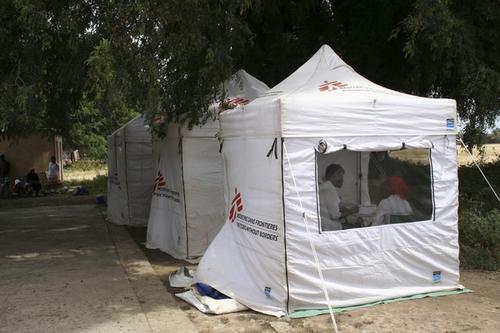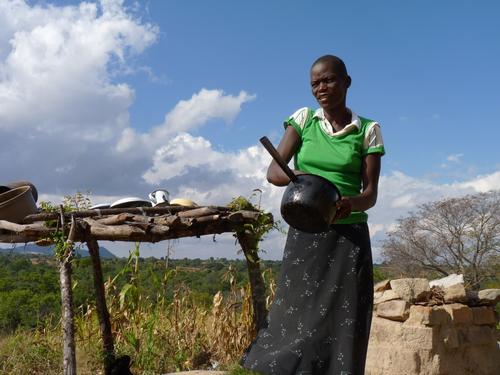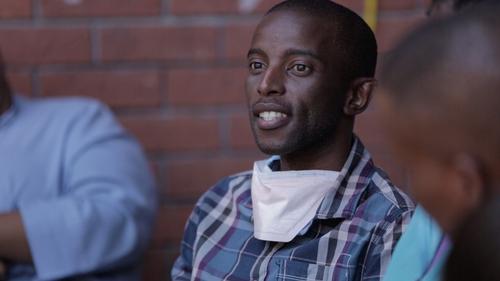MSF leaves Musina, South Africa, with a legacy of innovation
After six years of providing healthcare to farm workers along South Africa’s border with Zimbabwe, Médecins Sans Frontières (MSF) has handed over its activities to the department of health and nongovernmental partners. MSF’s Project Coordinator, Avril Benoît, explains why integrated mobile care has been a lifesaver for this vulnerable population.
What was the aim of the project in Musina?
MSF started its activities here in late 2007 in response to an influx of asylum seekers and migrants fleeing political violence and economic collapse in Zimbabwe. The following year, as Zimbabweans kept pouring in, cholera swept the region. By 2009, MSF began focussing on the roughly 10,000 migrant workers on a belt of farms along the border. On some farms, testing for HIV revealed positivity rates of 40 to 46 per cent – much higher than the district average of 14 per cent. Three quarters of these farm labourers weren’t receiving HIV treatment even though it was freely available in town.
Why weren’t they getting the treatment they needed?
For several reasons, one being the 50-kilometre distance between farms and Musina’s health facilities. For patients barely earning a wage they could survive on, the taxi fare to a clinic was too costly for them. Gangs nicknamed magumagumas stalked the bushes to rob and rape those who dared to walk or hitchhike to Musina.
Those who did make it to the HIV clinic in town found it to be overwhelmed with patients, creating such long waiting times that patients had to lose a day’s wages just to pick up their medication. Another barrier was the mobility of seasonal workers who were diagnosed with HIV. Chasing job opportunities from one farm to the next, or periodically returning to Zimbabwe for months at a time, made it difficult to attend five initiation appointments before even starting on antiretroviral treatments.
Lastly, undocumented foreigners were so wary of xenophobia or being deported, that they tended to avoid interaction with government officials – including medical staff in public hospitals and clinics.
How did MSF manage to reach this population?
The model of care our medical teams developed over the years took into account the special needs of farm workers and their families. For example, mobile teams visited the farm compounds on a regular schedule to spare everyone the need to take unpaid leave to travel to distant health centres. In order to reduce the risk of a seasonal worker running out of antiretroviral medication when they went home to Zimbabwe or moved to another farm, we provided them with a three-month buffer stock of drugs, specific information about where to obtain more drugs at their destination if they needed it, and a referral letter called a “safe travel pack”. During treatment adherence counselling, we made a point of always asking about their travel plans. Patients were also provided with their own “health passport” records that documented their current treatment plan and health status. We recruited and trained community health workers on the farms to do regular HIV and TB counselling and testing, to do tracing and follow-up of those on treatment, to refer those needing healthcare to the department of health services, and to run HIV support groups that matched the schedules and specific interests of farm workers.
Has the model been successful?
A significant achievement is that 90 per cent of patients remained in care one year after starting their HIV treatment. Six months into treatment, 90 per cent had suppressed viral loads – a sign the medication was working because they had almost no detectable HIV in their blood – and at twelve months it was 92 per cent.
These results are comparable to well-functioning programmes delivered in other parts of South Africa where the population isn’t nearly as mobile and rural. The provincial government is now advocating for the roll-out of the Musina Model of Care, as it has become known, on many more farms.
How did MSF help prepare the Department of Health to take over?
Our ambition was to develop an innovative strategy that would work, in the long-term, without us – not just on Musina farms, but any place with hard-to-reach migrant populations and a high burden of HIV/TB. Our medical team started the step-by-step handover process a year ago when the Limpopo provincial government embraced its responsibility to take over. We mentored government nurses to build up their technical and organizational capacity. MSF advocated for the mobile Primary Health Care teams to obtain more human resources and the necessary support from other health organizations. The Department of Health has assured us that it has the capacity and will to successfully run the programme.







